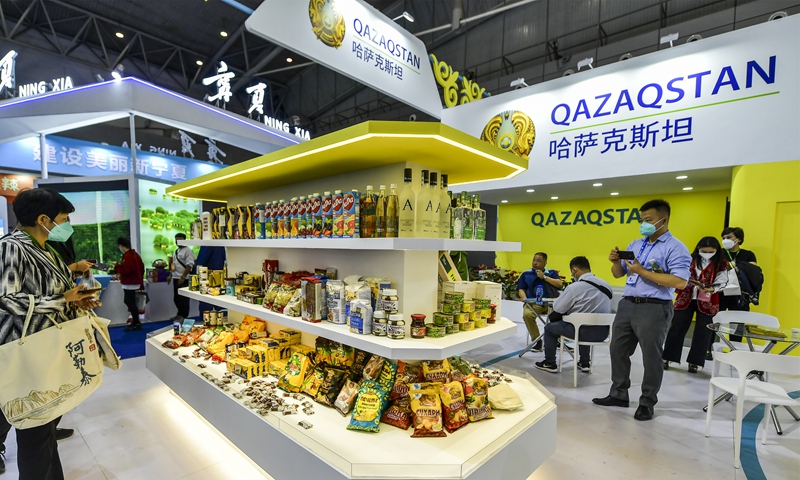
The 7th China-Eurasia Expo. Photo: cnsphoto
Companies attending the 7th China-Eurasia Expo in Urumqi, Northwest China's Xinjiang region said the increased use of the yuan in cross-border trade in Central Asia is making business more convenient and reducing foreign exchange risks stemming from the use of the US dollar, and they called for more arrangements to allow yuan settlement in more countries.
Experts said the yuan's internationalization process has been gaining pace of late, with the freshly announced agreement between China's central bank and the central bank of Kazakhstan to establish yuan-clearing arrangements in Kazakhstan on Tuesday.
Zhang Sixin, chairman of a logistics company based in Xinjiang, said that his company has increased the use of the yuan as the cross-border settlement currency. Just recently, his company forwarded 3.5 million yuan ($496,500) to partners in Kazakhstan via a Chinese bank.
Zhang said foreign exchange gains or losses pose a risk to the company's operations, recalling an "incident" in which the company lost 70,000 yuan due to a delay of several hours. "So, we value such service dearly," he said.
Zhang Hongping, chairwoman of the Xinjiang-based Ya'ou International Materials Exchange Center Co, told the Global Times on the sidelines of the expo on Wednesday that for her company, which is engaged in the cross-border trading of commodities, the availability of cross-border yuan settlement would be a huge boon.
"Such an idea has been more frequently pondered in recent months, and our cooperation partners - the exchanges in Uzbekistan and Belarus - also agree to include yuan settlement once conditions are ripe," Zhang said, noting that for the settlement of commodities such as timber, minerals and consumer goods, switching to the yuan would greatly benefit the exchange.
Zhang's exchange is trying to tie up with exchanges in Uzbekistan and Belarus and form an exchange alliance from member countries of the Shanghai Cooperation Organisation (SCO), and she noted that it would be great to have yuan settlement in the network.
Xinjiang could play an important role in expanding use of yuan in cross-border settlements with Central Asian countries, analysts said.
In 2021, Xinjiang's cross-border yuan settlements soared 19.5 percent year-on-year to 49.27 billion yuan.
Cross-border settlements with neighboring countries jumped by 71.6 percent, according to a March report by domestic news portal ts.cn.
Amid rising geopolitical risks, the talk of using the yuan as a settlement currency in Central Asia has received rising attention.
Djoomart Otorbaev, former prime minister of the Kyrgyz Republic and a distinguished professor of the Belt and Road School of Beijing Normal University, wrote in an article in April on CGTN that it would be unwise to continue to use the US dollar in financial transactions in Central Asia.
The use of the yuan as the strongest regional currency will be essential for a more stable and predictable economic and trade relationship between Central Asia and China, Otorbaev argued, noting that policymakers should pay special attention to reforming the system of interactions of national currencies and make sure that the new principles should not introduce uncertainty and nervousness into economic relations but become a source of development and stability.
Trade and economic relations with Russia and China are the most important for the countries in Central Asia, analysts noted.
Amid the West's SWIFT sanctions against Russia and rising geopolitical conflicts, more Central Asian countries began to realize the importance of having an alternative for international payments, said Zhou Yu, director of the Research Center of International Finance at the Shanghai Academy of Social Sciences.
"Now we are seeing not only the awareness but also concrete steps on that direction," Zhou told the Global Times on Wednesday.
Zhou said a series of announcements in recent weeks showed the global process of de-dollarization was accelerating, prompted by the US' sanctions against Russia and aggressive rate hikes by the Fed, which are deemed risky by countries over concerns of capital outflows.
On September 16, leaders of the SCO member states signed and released the Samarkand Declaration, which called for continuously expanding cooperation in local currency settlement.
One day earlier, in a meeting between the heads of state of China, Russia and Mongolia, work for more outcomes in trilateral cooperation and the expansion of settlement in local currencies in trade were also stressed.
Russian and Mongolian financial institutions were welcome to join the yuan-based Cross-border Interbank Payment System to build a strong bulwark of financial security in the region.
Regarding its deal with the central bank of Kazakhstan, the People's Bank of China said these arrangements will help enterprises and financial institutions of both countries to conduct cross-border transactions using the yuan, while also facilitating bilateral trade and investment.
Central Asian countries traditionally use the US dollar as the currency for international trade settlement. Experts said that as more Central Asian countries pivot toward using the yuan, international trade in the region will be further facilitated, and contribute to the global trend for de-dollarization.
Yet for the yuan to expand its presence in Central Asia, time and more concrete work are needed.
"With the changing of the geopolitical landscape, now more and more countries in Central Asia are willing to accept the yuan, but domestic banks have to set up branches in these countries first [for the clearing function]," Zhang Hongping said.
Uzbekistan, Tajikistan and Kyrgyzstan still have no presence of Chinese banks, Zhang said.
Zhou said the yuan's relatively stable exchange rate and market anticipation of gradual appreciation has ensured its popularity among many developing countries, suggesting that sourcing the clearing business to banks in some of the partner countries may be a way to accelerate the scope of yuan cross-border settlement in the region.




